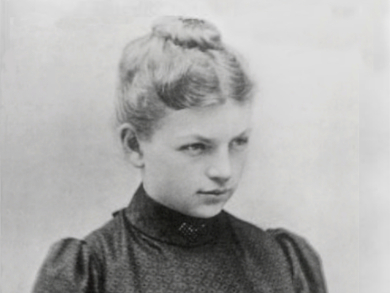Clara Immerwahr, a role model for her pursuit of science in spite of obstacles and for her strong moral convictions, was born in Polkendorf near Breslau (today Wrocław, Poland) on June 21, 1870. She was the youngest daughter of the chemist Philipp Immerwahr.
Immerwahr showed an interest and aptitude for science, but at first had to settle for girl’s school and teachers college. Women had very limited opportunities for higher education at the time, and faced societal pressure to marry and focus on being a wife and mother. Fighting for special permission, she attended university lectures as a guest. Clara Immerwahr received her Ph.D. in chemistry from the University of Breslau in 1900 for work under Richard Abegg on the topic of the solubility of heavy metal salts. She was the first woman to earn a Ph.D. there. In 1901, she married fellow chemist Fritz Haber, and a year later gave birth to a son. Marriage severely limited her opportunities to perform research, and she found herself reduced to contributions to her husbands work and talks on popular science for women.
Fritz Haber is a profoundly controversial scientist. He had developed a strategy for nitrogen fixation that allows the production of artificial fertilizer, important for food production to this day. However, the same Haber-Bosch process allowed Germany to produce explosives during World War I, independent of the saltpeter previously imported from Chile. He also played an important role in developing gas warfare. In spite of the Hague Convention of 1907, which expressedly forbid “projectiles the sole object of which is the diffusion of asphyxiating or deleterious gases”, Germany released chlorine gas under Haber’s supervision at the Battle of Ypres on April 22, 1915.
Clara, herself a pacifist, was strongly troubled by her husbands work on chemical warfare, calling it a “perversion of the ideals of science”. On May 2, 1915, the night Fritz Haber celebrated his promotion to captain after returning from the site of the first successful gas attack, she committed suicide – an act commonly interpreted as a final, desperate protest. There are few remaining historical records on her motives.
Today, there are several awards named after Clara Immerwahr, honoring both scientific achievements and moral convictions: The Clara Immerwahr Award launched by UniCat, Berlin, Germany, is presented annually to a young female scientist, and the German Section of International Physicians for the Prevention of Nuclear War named its most prestigious award the Clara Immerwahr Prize.
Clara Immerwahr is the answer to Guess the Chemist (41).
References
- Fritz Haber: The Damned Scientist
M. Dunikowska, L. Turko,
Angew. Chem. Int. Ed. 2011, 50, 10050–10062.
DOI: 10.1002/anie.201105425 - Der Fall Clara Immerwahr: Leben für eine humane Wissenschaft (in German),
Gerit von Leitner,
C. H. Beck, München, 1993.
ISBN: 978-3-406-37114-1
Publications by Clara Immerwahr
- Potentiale von Cu-Elektroden in Lösungen analytisch wichtiger Cu-Niederschläge (in German),
C. Immerwahr,
Z. Anorg. Chem. 1900, 24, 269–279.
DOI: 10.1002/zaac.19000240119 - Zur Kenntnis der Löslichkeit von Schwermetallniederschlägen auf elektrochemischem Wege (in German),
C. Immerwahr,
Z. Elektrochem. 1901, 477–488.
DOI: 10.1002/bbpc.19010073502
Also of Interest
- How Chemicals Became Weapons,
ChemistryViews 2015. - Clara Immerwahr Award
ChemViews Mag. 2015. - 80th Anniversary of Fritz Haber’s Death,
ChemViews Mag. 2014. - Clara Immerwahr Memorialized in Wrocław,
ChemViews Mag. 2011.




